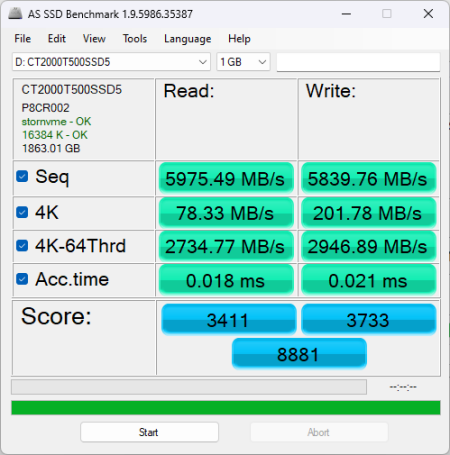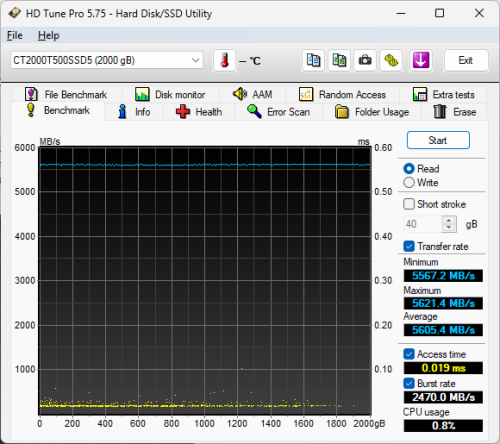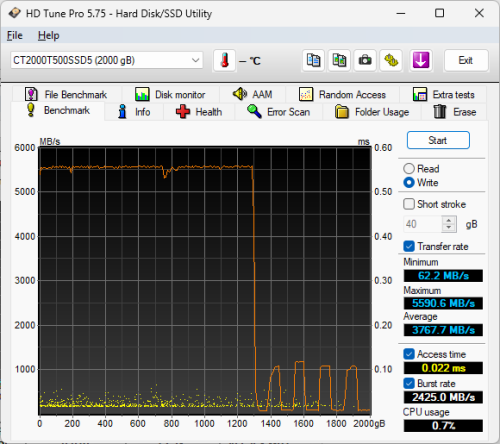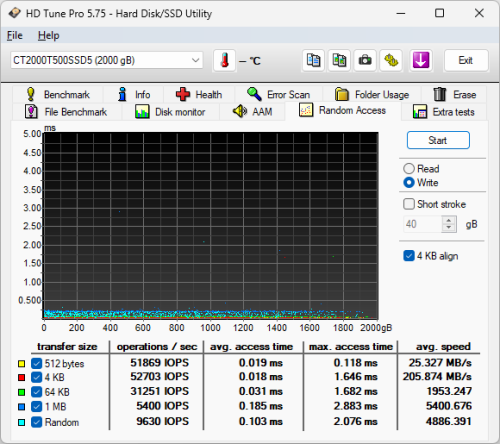![]()
![]()
Model: Silicon Power US75 1TB PCIe Gen 4x4 Solid State Drive
Manufacturer: Silicon Power
Provided By: Silicon Power
Silicon Power is a relatively new name in the storage industry. Founded in 2003 by a group of professionals specializing in international business, global marketing and technical engineering, the company has already established itself as one of Taiwan's top manufacturers. With an eye for attractive and versatile design, Silicon Power has built its brand around the concept that its customers deserve products that represent who they are in life and mirror their personality. The end result is a variety of uniquely designed storage products including USB flash drives, memory cards and solid-state drives (SSD).
One of the latest additions to Silicon Power's line of solid state drives is the US75. Designed for content-creators, power users and gamers, this compact, M.2 form factor drive is powered by Maxio Technology's MAP1602 controller and is available with up to 4TB of YMTC's 232-layer 3D TLC NAND flash. The US75 also features built-in data security and error-correction capabilities and is equipped with an ultra-fast PCIe Gen 4x4 NVMe 2.0 interface to deliver up to 7,000 MB/s read and 6,500 MB/s write speeds.
The US75 is available in 500GB, 1TB, 2TB and 4TB capacities. For this review, Silicon Power sent us the 1TB version of the drive which is capable of delivering up to 7,000 MB/s sequential read and 6,000 MB/s sequential write speeds.
Needless to say, this is only a taste of what the US75 has to offer. To give you an idea of what to expect, we'll take a closer look at Silicon Power's new PCIe 4.0 SSD and then see how well it performs. Does the US75 have what it takes? Can it deliver the value and performance we've come to expect from Silicon Power? Keep reading as we find out.
Instead of a box, the US75 comes packaged in a cardboard blister pack. The packaging advertises some of the drive's key features including its 1TB capacity, PCIe Gen 4x4 interface, support for NVMe 2.0, maximum read and write speeds and 5 year warranty.
![]()
![]()
Physical Features:
The US75 uses the 2280 form factor for M.2 (NGFF) SSDs. It measures 22 x 80 x 3.6 mm and weighs in at 8g. The drive also has an "M key" edge connector which provides PCIe SSDs with up to 4x lanes of bandwidth.
![]()
The US75 uses Maxio Technology's MAP1602 controller chip. This DRAM-less, PCIe Gen 4x4 NVMe 2.0 controller is equipped with a quad-core ARM Cortex R5 CPU and has 4 NAND channels with four chip enables (CE) per channel. The MAP1602 also offers support for 3D TLC/QLC NAND flash as well as Maxio's Agile ECC error correction technology.
![]()
For the 1TB version of the US75, Silicon Power opted to use YMTC's 232-layer 3D TLC NAND flash. Looking at the picture above, you can see four 256GB NAND flash packages on the top of the PCB. There is also no DRAM cache chip as the US75's controller takes full advantage of NVMe's Host Memory Buffer feature by using a small portion of the computer's memory to cache the mapping tables.
The test system used in this review is equipped with an AMD Ryzen 9 7900x CPU, Gigabyte B650E AORUS master motherboard, 32GB (16GB x 2) of Corsair Vengeance 5200MT/s DDR5 memory, Samsung 990 Pro 2TB SSD and a GIGABYTE GeForce GTX 1060 WINDFORCE OC 6G graphics card. For the operating system, I used the latest version of Windows 11.
To test the performance of Silicon Power's US75 SSD, I ran a series of benchmarks using CrystalDiskMark, ATTO Disk Benchmark, AS SSD, HD Tune Pro, Anvil's Storage Utilities, Iometer and PCMark. For comparison, I've also included test results from the Samsung 990 EVO, Silicon Power PX10, Crucial T500, ADATA SE920, ADATA LEGEND 970, Crucial T700, Solidigm P44 Pro, Samsung 990 PRO, ADATA LEGEND 960, Crucial P3 Plus, SK hynix Platinum P41, Silicon Power XS70, WD_BLACK SN770, ADATA XPG ATOM 50, ADATA XPG GAMMIX S70 Blade, Crucial P5 Plus, Plextor M10PY, ADATA XPG GAMMIX S70, Sabrent Rocket 4 Plus, WD_BLACK SN850, Silicon Power US70, ADATA XPG GAMMIX S50 Lite, Crucial X10 Pro, Crucial X9 Pro, ADATA Elite SE880, Kingston XS2000, ADATA XPG ATOM 30, Samsung 980, Silicon-Power UD70, Crucial P2, SK hynix Gold P31 and Crucial P5.
![]()
As I mentioned earlier, the US75 uses Maxio's MAP1602 controller chip. Looking at the screenshot above, you can see that it performs equally well with both incompressible (0%) and compressible (100%) data.
CrystalDiskMark 8.0.4:
First, I ran a few quick tests using CrystalDiskMark. This benchmark measures the performance of a storage device by testing its sequential and random read and write speeds. For this test, we're using the peak and real world profiles.
![]()
According to Silicon Power, the 1TB US75 is capable of reading at 7,000 MB/s and writing at 6,000 MB/s. As you can see, the drive had no problems reaching these speeds in CrystalDiskMark's sequential read and write tests.
![]()
As you'd expect, the US75 wasn't as fast when tested with the "real world" profile which uses a single thread and a much lower queue depth. Nevertheless, it was still able to read at 4,430 MB/s and write at more than 5,800 MB/s.
ATTO Disk Benchmark 4.01:
I also used ATTO Disk Benchmark to test the US75's sequential read and write speeds. The tests are run using blocks ranging in size from 512B to 64 MB and the total length set to 256MB.
When tested with ATTO, the US75's read speeds topped out at about 6.90 GB/s and its write speeds at 5.48 GB/s.
AS SSD:
AS SSD is a benchmark designed specifically for solid state drives. The application contains five synthetic tests used to determine the sequential and random read and write performance of a drive.
AS SSD also includes a copy benchmark. This test copies an ISO (two large files), program (many small files) and game (small and large files), returning the speed and duration of each.
HD Tune Pro 5.75:
Next, I ran a series of tests using HD Tune Pro. This hard disk utility measures a drive's performance by testing its sequential read and write speeds as well as its access time, burst rate and CPU usage. For this review, I'm also going to use it to benchmark the US75's random read and write speeds, random access times and the number of operations per second.
The US75 performed relatively well when benchmarked with HD Tune. The drive had average read and write speeds of 6127.3 MB/s and 5167.2 MB/s, respectively.
When reading 4KB blocks, the US75 reached 59,371 IOPS and had an average speed of 231.921 MB/s. The drive was even faster when writing, reaching 62,096 IOPS with an average speed of 242.564 MB/s.
Anvil's Storage Utilities:
Anvil's Storage Utilities is another benchmark designed with SSDs in mind. The standard storage benchmark measures a drive's performance by testing its transfer speeds, access times and IOPS.
![]()
Iometer:
Lastly, I ran a series of tests using Iometer. This tool can be configured to benchmark a number of things. In this case, I used it to measure the US75's read and write speeds and the number of operations per second. The tests were run using random bytes and a queue depth of 3.
![]()
The US75's performance was very similar to what we saw in our other tests. The drive was able to read at 6776.01 MB/s and write at 5999.92 MB/s.
![]()
The US75 also performed fairly well when doing random reads and writes. In our tests, the drive was able to read at 330.37 MB/s and write at a blazing 982.84 MB/s.
![]()
Silicon Power really doesn't say what the US75 is capable of in regards to IOPS. With two threads and a queue depth of three, the drive reached 84,575 random read IOPS and 251,607 random write IOPS.
![]()
As with most drives, the US75 performed better with more threads and at higher queue depths. With sixteen threads and the queue depth set to 32, it reached 691,046 random read IOPS and 980,905 random write IOPS.
PCMark 8 - Storage Test:
PCMark 8 is a complete benchmark for Windows. It includes five benchmark tests, each designed around a specific scenario. The storage benchmark measures drive performance using real-world traces recorded from Adobe Creative Suite, Microsoft Office and a selection of popular games.
![]()
PCMark 8 also includes a consistency test which measures the performance consistency and degradation tendency of a storage system. The test reports the performance level at the start, the degraded steady-state and the recovered state as well as the number of iterations required to reach the degraded state and the recovered state. For this test, we are focusing on the Adobe Photoshop (Heavy) trace and will look at both the bandwidth and latency of the drive
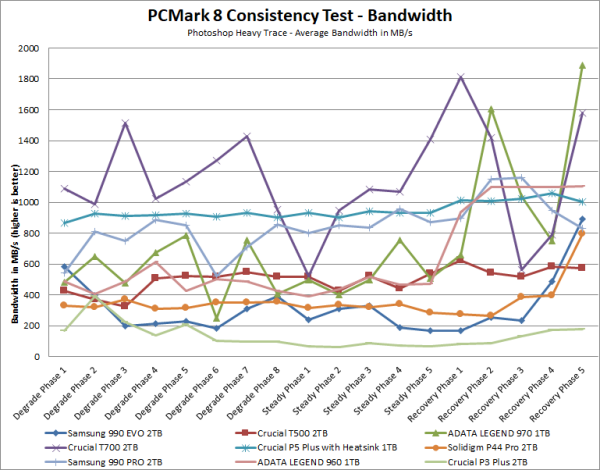
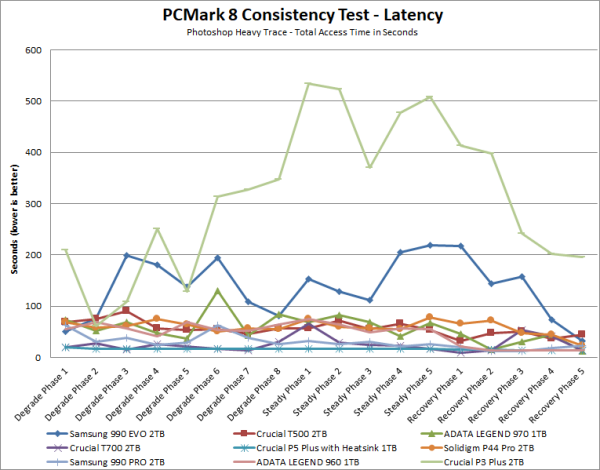
The US75 didn't do as well as some of the other drives in this test. During the degradation and steady phases, its bandwidth dropped below 300 MB/s. The US75's performance did increase somewhat during the last recovery phase. However, with it topping out at only 394 MB/s, it lagged well behind the Samsung 990 PRO and Crucial P5 Plus.
PCMark 10 - Full System Drive Benchmark:
PCMark 10's Full System Drive Benchmark uses a wide-ranging set of real-world traces from popular applications and common tasks to fully test the performance of the fastest modern drives. This benchmark produces an overall score as a measure of drive performance. Comparing devices is as simple as comparing scores. The tests also measure and report the bandwidth and average access time performance for the drive.
![]()
The US75 performed relatively well for a DRAM-less drive. As you can see, it wasn't nearly as fast as the Crucial T500 or Samsung 990 PRO However, it scored better than other PCIe 4.0 SSDs like the Crucial P5 Plus and ADATA XPG GAMMIX S70.
Temperature:
While faster than their SATA-based SSDs, PCIe drives like the US75 tend to generate more heat. In fact, if your computer doesn't have enough airflow or a large video card covering your M.2 slots, they can get quite hot. To prevent themselves from overheating, most SSDs have implemented a mechanism called thermal throttling which automatically reduces a drive's performance when it reaches a certain temperature.
![]()
While not the hottest SSD we've looked at, the US75 can get get a bit toasty. At idle, temperatures hovered around 37 ºC. When pushed hard, the drive reached temperatures as high as 81 ºC when reading and writing. When the US75 reached this temperature, thermal throttling would kick in and limit its performance.
Final Thoughts:
The Silicon Power US75 is a great choice for the gamer or content-creator looking for a fast, yet affordable, PCIe Gen 4 SSD for their laptop computer or PlayStation 5 gaming console. This compact, M.2 form factor drive is powered by Maxio Technology's MAP1602 controller and is available with up to 4TB of YMTC's 232-layer 3D TLC NAND flash. Combine this with NVMe's Host Memory Buffer (HMB) technology and a PCIe Gen 4x4 interface and you have a drive capable of transferring data at nearly twice the speed of most Gen3 NVMe SSDs. In our sequential read and write tests, the 1TB version of the US75 was able to read at speeds as high as 7,402 MB/s and write at speeds in excess of 6,274 MB/s. The drive also did very well in our random write tests, producing more than 251,000 IOPS at low queue depths.
The US75 is available now in 500GB, 1TB, 2TB and 4TB capacities. Prices range from $58 up to $246, with the 1TB version reviewed here retailing for about $80.

Highs:
- Available in 500GB, 1TB, 2TB and 4TB capacities
- PCIe 4.0 x4 interface with NVMe protocol
- Maxio MAP1602 controller
- YMTC 232-layer 3D TLC NAND flash
- Very good sequential and random read and write performance
- Small M.2 2280 form factor
- Affordably priced
- Host Memory Buffer (HMB)
- 5 year warranty
Lows:
- Can get hot under heavy workloads
- Does not support hardware based encryption

